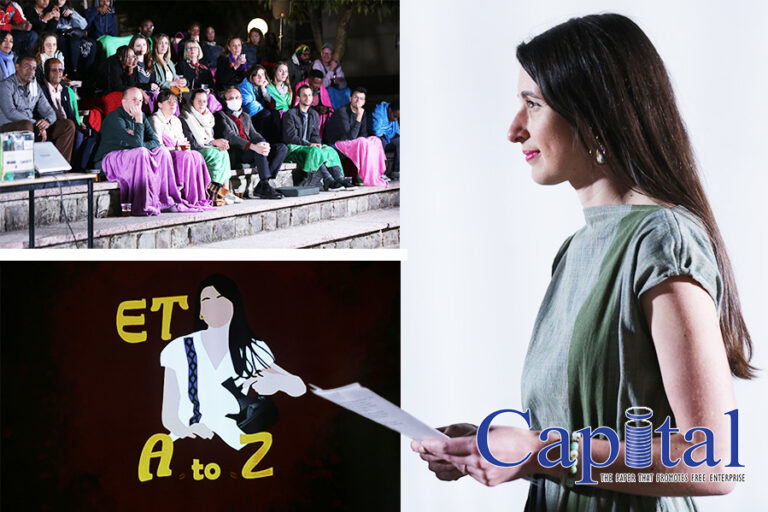‘ET A to Z’ docuseries by Emeline Wuilbercq was inaugurated at the Alliance Ethio-Française on Thursday January 27, 2022. Two episodes from the series were exclusively screened at the Alliance Ethio-Française in the presence of invited guests.
ATW calls on responsible tourism rockstars to enter WTM Responsible Tourism Awards
Africa Travel Week (ATW) is calling on responsible tourism businesses to submit their applications for the WTM Responsible Tourism Awards 2022 by 28 February.
“With just a few weeks to go, we are urging all those responsible tourism rockstars to get their entries in as soon as possible,” says Martin Hiller, Content + Creative Director: Travel, Tourism & Creative Industries at RX Exhibitions.
“Considering the challenges our industry has experienced, we want to celebrate those who continue to make a positive impact and lead by example. Sustainability champions, changemakers, movers and shakers this one’s for you!”
Established in 2004, the WTM World Responsible Tourism Awards showcases the best of the best in responsible tourism, setting the compass for the global industry to take responsibility in creating sustainable travel and holiday experiences.
Free to enter, the 2022 Awards is split into four regions: Africa, India, Latin America, and the rest of the world. The winner from each region will go on to compete in the Global Awards taking place at WTM London from 7-9 November this year.
Registrants can apply for the following ten categories:
- Decarbonising Travel & Tourism
- Sustaining Employees and Communities through the Pandemic
- Destinations Building Back Better Post-COVID
- Increasing Diversity in Tourism: How inclusive is our industry?
- Reducing Plastic Waste in the Environment
- Growing the Local Economic Benefit
- Access for the Differently-Abled as Travellers, Employees and Holidaymakers
- Increasing Tourism’s Contribution to Natural Heritage and Biodiversity
- Conserving Water and Improving Water Security and Supply for Neighbours
- Contributing to Cultural Heritage
“As a winner, or even a finalist, taking part in this prestigious initiative offers more than just bragging rights and boosting team morale,” Hiller explains. “The experience leverages increased PR and press opportunities to help build your reputation, with the opportunity to connect with industry leaders from around the world.”
The Responsible Tourism format at ATW this year is as follows:
- 11 April: Responsible Tourism Awards presented live on the Global Stage
- 12 April: Responsible Tourism Conference live at the custom-built INSPIRE conference
- 13 April: Workshop discussion based on the 2002 Cape Town Declaration on Responsible Tourism
“This year’s programme will not disappoint!” adds Hiller. “Our team has been hard at work ensuring an exceptional experience for participants and attendees.”
The live conference will cover a range of insightful topics such as inclusive travel, decarbonisation, biodiversity, and local economic benefit. The in-person workshop will be facilitated by Harold Goodwin, WTM’s Responsible Tourism Advisor and co-author of the declaration, which will form the basis of the interactive discussions.
“Don’t miss your chance to be seen and to help shine a spotlight on Africa as a continent that truly cares for its people, places, and the wellbeing of our planet,” urges Hiller.
“If this sounds like an opportunity for someone you know, pay it forward by nominating them before on the WTM global hub before the deadline. Remember, winners don’t wait!” she concludes.
How Ethiopia’s removal from AGOA be a blessing in disguise for the AfCFTA
The Biden administration’s decision to remove Ethiopia from AGOA under the preconceived notion of the human rights violation that has ensued in and around the northern part of the country, has caused waves to Ethiopians living in Ethiopia and around the world. After stating the eligibility requirements, outlined in section 104 of the act, which also includes that member countries should also work towards improving their rule of law as well as defending human rights and respecting international labor standards.
But the irony in the virtue signaling of the administration is very prevalent. The short-term to long-term effects of the decision to remove Ethiopia for AGOA privileges and the general public who had been benefiting from this trade agreement, which is tallied at around 1 million jobs (directly as well as indirectly) as well as contribute to the development of the country’s economy to sustain itself, will only cause further problems even more so than the supposed “human rights violations” the Ethiopian government has been accused of. With that being said the removal of Ethiopia from the AGOA will most likely only cause a short-term economic dis-stability, but only with the hopes of the acceleration of the AfCFTA.
I have laid down three factors that will most likely help speed up the process.
The ripple effect caused by the decision of the US to multiple African countries
When AGOA was first established in 2000, it was initially enacted to last up until 2015 but it was then renewed for another 10 years until 2025. The main issue with this agreement is that there is no certainty in how long this deal would last for every member nation. If the US decides to not renew this agreement most if not all country members would be left in limbo and be left to fend for themselves. This uncertainty will sure have left the 30+ member states questioning the transformative behavior of this agreement with the USA and will cause these countries to find alternative means of economic stability and longevity to their economic growth.
“The future is currently quite unclear, it’s a message that we’re going to be repeating today and over the next two days, that it’s really critical for the US to indicate and make clear what sort of regime it hopes to open up for Africa if AGOA is not extended.”- Betty Maina, Kenya’s cabinet secretary for industrialization, trade and enterprise development, told a private sector virtual forum hosted by the Washington-based Corporate Council on Africa, in October of 2021.
That’s when the AfCFTA comes in, if this happens to Ethiopia there is no guarantee it won’t happen to other member African countries. AfCFTA on the other hand is the best option for Africans to determine their fates on their terms and not worry each time they don’t comply with the westerners’ demands for support. Since its initial inception, the main intention was to garner as many African countries into joining this trade agreement which would see them capitalize on labor mobility and other main comparative advantages which would lead to an all-African sustainability program.
Currently, intra-African trade is a mere 15%-18%, compared to around 47% in America, 61% in Asia, and 67% in Europe (according to UNCTAD data), but the AfCFTA could radically change that. If the agreement is fully implemented, the gross domestic product of most African countries could increase by 1% to 3% once all tariffs are eliminated, according to UNCTAD estimates. What this shows is by a simple strategy of preferential trade liberalization under the AfCFTA, Africa would become an industrialized continent in mere decades.
The rise of pan-Africanism during the current political climate in Africa
Pan-Africanism emerged at the end of the 19th century as an idea and later an action plan by Africans who resided in colonial territories a response to slavery, imperialism, colonialism, and racism. The idea is to create an Africa by Africans to Africans, this means creating a united Africa that would only rely on each other instead of depending on help from other continents.
Starting from the second decade of the 21st century, there have been several positive storylines about Africa. At an economic level, there seem to exist various reports that point to Africa as a ‘new growth frontier’. Over 60% of the African population is youth, which means a large number of the potential labor force. In terms of class formation, Africa’s ‘middle class’ shows to be on the rise. The progression of a pan-African agenda will rely upon a major cardinal cognizance: that we need to reclaim, restore and reassert pan-Africanism and overcome neo-colonialism.
During the past year and a half, many African countries have been standing up to their neo-colonialist “partners”, stating Africa doesn’t need any more support from their previous colonial rulers. And what better way to do it than to fast-track the African Continental Free Trade Area (AfCFTA).
The realization of Africa’s dependency on AGOA, and AGOA’s failure to facilitate sufficient market access among African countries
When news broke out about Ethiopia, Mali, and Guinea, the consequences to those countries showcased that African countries under the AGOA were vulnerable to the same outcomes if push came to shove or even if the US decided not to renew after 2025.
Despite the fact that AGOA has been instrumental for economic development for African countries, it still has various intrinsic defects that have been neglected in helping countries advance this relationship. AGOA has been ineffective in supporting African countries in overcoming some of the underlying limitations of their economies. Also, for American organizations, it has neglected to work with sufficient market access in African nations.
After almost twenty years of AGOA benefits, numerous African nations haven’t been using the opportunity in its entirety: partially because of the narrow structure of their economies, permitting them to just exploit a small number of duty-free lines; and partially because of the US market direction to economies of scale in manufacturing and exports to be competitive (even with a duty-free advantage), so rather than making it easier it kept it at a constant.
So, what’s next for Ethiopia and the rest of Africa?
As an economist I have to say it like it is, the removal of Ethiopia from AGOA will have deep underlying repercussions. Even though the numbers aren’t that significant when it comes to the quantity of exports and the quantity of foreign exchange gained during the AGOA period, it will still cause an increase in unemployment, foreign currency deficit and FDI. But as the years went by the balance of trade was in favor of the US as opposed to Ethiopia (the one that should be benefiting the most).
Although, Ethiopia was experiencing a negative trade balance it doesn’t imply the US was gaining from it either. What the data shows is the amount of exports Ethiopia had compared to the US.
Before the AGOA the US wasn’t exporting as many commodities to Ethiopia as compared to its later years, but the same goes for Ethiopia. In 2000 Ethiopia only exported $29m worth of commodities to the US, but in 2020 Ethiopia had exported $525m worth of commodities, which can be attributed to the AGOA. So even though the positive trade balance seems to tilt to the US rather than Ethiopia it still implies without the AGOA the balance of trade would possibly look even worse. The other huge loss to Ethiopia is the large amounts of unemployment it would cause, hundreds of thousands of people will lose their jobs. This would-be adding salt to the wound because Ethiopia already has been struggling with double-digit unemployment rates for at least a decade.
In conclusion, as Emperor Haile Selassie I once said while speaking to the league of nations (specifically directed to African countries) ‘‘if it happened to us, it will happen to you’’. This very statement applies now more than ever, so as Africans we should unite and help fast-track this African continental free trade area agreement as soon as possible by supporting policies and entities that could speed up the process.
Bekan Bekele is a researcher for Wennovate Consultancy, a private consultancy firm that specializes in entrepreneurship, tourism, and investment.
You can find him at bekan.bekele74@gmail.com
Ethiopia Bunna striker Abubaker traveled to South African Sundown
Ethiopia Bunna gave its blessing for their prized striker Abubaker Naser to have a two weeks trial with South African giant Mamelodi Sundown. It is disclosed Ethiopia Bunna covered all expenses for the players two weeks stay in Pretoria.
Though the Ethiopian national team returned home early from the ongoing Cameroon Nations Cup final, the striker who won last season Ethiopian Premier League top scorers award with 24 goals in to his name appeared to impress the scouts who contacted the club on behalf of South African defending champion and current league leaders Mamelodi Sundown.
Once Abubaker ends his two weeks trial in success, the transfer negotiation will take place between the two clubs for the striker has a four year remaining contract with Ethiopia Bunna. Sources close to the club suggest that Ethiopia Bunna is more than happy to give away the striker in exchange for good money for the club. It is rumored to face a financial constraint despite signing a sponsorship agreement with Bunna Bank recently.
With the suspended league season to resume over the weekend, target man Abubaker is no more available in the coming three matches against Hawassa, Adama and Addis Ababa City.
If things go smooth and Abubaker land a contract, he becomes the third Ethiopian Footballer to play in South African league next to Fikru Tefera and current national team skipper Getaneh Kebede.







